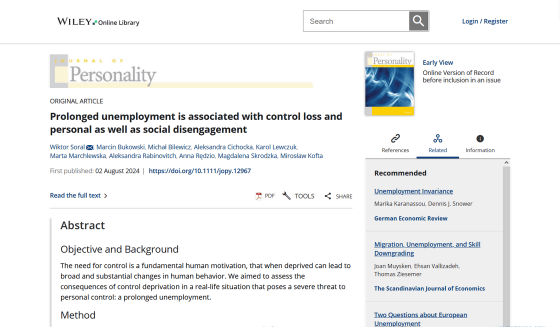Research shows that prolonged unemployment makes people apathetic and gives up trying to take control of their lives

The idea that we have control over our lives is fundamental to motivation, and if we lose that sense of control, it can have a profound effect on our minds, bodies, and behaviors. A new study has found that long-term unemployment is associated with lower happiness, lower self-esteem, lethargy, and a sense of loss of control.
Prolonged unemployment is associated with control loss and personal as well as social disengagement - Soral - Journal of Personality - Wiley Online Library

Long-term unemployment leads to disengagement and apathy, rather than efforts to regain control
https://www.psypost.org/long-term-unemployment-leads-to-disengagement-and-apathy-rather-than-efforts-to-regain-control/
Losing a job is a significant stressor that can affect mental health. Not only does losing a job mean losing economic benefits like income and social security, but it also means losing potential benefits like routine and social connections.
So a team led by Dr. Viktor Solal, a psychology researcher at the University of Warsaw in Poland, investigated how long-term unemployment affects psychological functioning and social adjustment. Specifically, they investigated whether long-term unemployment manifests as disengagement and helplessness, or whether it leads to attempts to regain control over one's life.
The study included 1,055 Polish participants, of whom 748 were unemployed and 307 were employed. The unemployed were divided into three groups according to the duration of their unemployment: short-term (0-3 months), medium-term (4-12 months), and long-term (more than 12 months).
The research team collected demographic information about the participants, such as age, sex, education level and place of residence, and also had them complete questionnaires assessing their happiness, self-esteem, perceived sense of control (personal, political and fatalistic), emotions, stress-coping strategies and social attitudes.

In their analysis, the researchers found that 'long-term unemployment' was strongly associated with decreased well-being and self-esteem, as well as an increased sense of loss of control over one's personal and destiny.
As participants' duration of unemployment increased, they reported more negative emotions, such as depression and fear, which are associated with reduced approach and avoidance behaviors, while positive emotions, particularly enthusiasm and other proactive behaviors, were diminished with prolonged unemployment.
These emotional withdrawals were accompanied by behavioral changes, such as a significant reduction in active stress coping and giving up on pursuing personal projects and future-oriented goals. These findings suggest that long-term unemployment promotes
On the social side, the long-term unemployed were more likely to withdraw from social and political activities, felt less civic, and were less likely to participate in collective actions such as protests. Furthermore, they showed higher levels of psychological defenses, including increased personal and collective narcissism and a tendency to blame external parties such as the government or corporations for their unemployment.

Interestingly, the study found that long-term unemployment did not lead to stronger belief in God or stronger justification for the social system. 'These results suggest that while long-term unemployed people become more defensive and withdrawn, they do not necessarily seek comfort or control through external systems,' the study's authors wrote.
Related Posts:
in Science, Posted by log1h_ik







